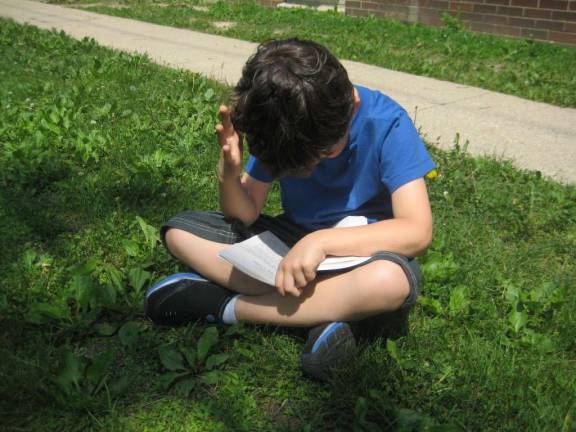The Perfect Place to Read

Encouraging the Love of Reading at Camp
Lauren Arend and Mary Rogers
"Yes, a reading program fits into camp. Sherwood [Forest] Camp is a lot more than camping, mosquitoes, and swimming - it's aimed at the whole child."
- Parent of a 2011 camper
On an especially hot day in June, twelve fourth-grade boys sit on Crazy Creek chairs in a cabin. The room is hot but quiet. Some boys fidget slightly or are looking around the room, but most have their noses buried in paperback copies of the book while their teacher reads out loud. This is summer camp, and nine-year-old boys are sitting around reading together.
After exploring the idea of a camp-based reading program in 2009, Sherwood Forest introduced a formal reading program the following summer. Mary Rogers, executive director, with the board of directors, wanted to encourage a love of reading. Camp could be a place where reading is one of the coolest things to do. In 2011, the reading program was implemented with sixteen fourth-grade campers and the reading program was expanded to include all of the fourth-grade campers in 2012. A total of twenty-four boys and twenty-four girls participated in the program. Campers met for one-and-a-quarter-hour sessions on most days. The boy campers focused on the book Hatchet by Gary Paulsen. Girl campers read the book Belle Prater's Boy by Ruth White.[](http://nypress.com/wp-content/uploads/2013/05/IMG_0192.jpg)
Summer Learning Loss
"Summer learning loss, or the "summer slide," refers to the loss of academic skills during the summer months. Researchers have found that the phenomenon of summer learning loss has a greater impact on those students who are already struggling in school. While the top 25 percent of students make slower but continued growth over the summer, average students maintain or even fall in their growth, and the bottom 25 percent of students lose a significant portion of the learning gains over the summer (Mikulecky, 1990).
Reading, Writing, and the Formation of Identity
Some might argue that that camp should be a "break" from formal academics. And a few of the campers and parents at agree. One parent said, "I want to know that he is reading AND having fun." A camper, although he enjoyed the program, remarked, "Next year I think I can take a break from reading."
Promising Results
Three years of evaluations of the reading program at Sherwood Forest have documented several specific positive outcomes.
Reading Attitudes
Recreational and academic reading attitudes improved for the whole group and the groups broken down by gender. The improvement in reading attitudes was particularly significant for boys.
Vocabulary
The majority of campers (75 percent) showed increases in vocabulary knowledge over the course of the reading program. Both the girl and boy reading groups demonstrated statistically significant gains in vocabulary scores.
Writing
Campers wrote in their journals each time they met in the reading program, responding to "prompt s" to focus their work. Overall, girls' writing scores were significantly higher than boys' scores. A significant improvement was found in writing scores over time for all campers. Additionally, boys increased their writing scores more than girls over the eighteen-day period.
Library Usage
Library usage data in the summer of 2012 revealed that campers enrolled in the 2011 reading program used the camp library more and checked out significantly more books than those campers who never participated in the reading program.
What is clear from three years of evaluations of the reading program is that reading at camp is fun and good for kids. There are real changes to the campers' views about reading and their abilities to express their thoughts in writing.
Originally printed in Camping Magazine, excerpted and reprinted by permission of the American Camp Association &Copy; 2013 American Camping Association, Inc.